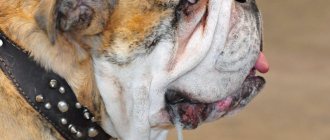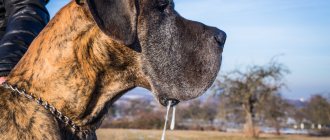When getting a pet, you need to know why your dog’s breath smells like rotten meat, and how to treat it. This symptom can occur in animals of different ages and breeds. Often it indicates serious illnesses that require immediate treatment.
The owner of the animal should remember that a nasty smell from the dog’s mouth always indicates the presence of some kind of problem. Basically, this is improper dental care, less often - disruption of the functioning of internal organs and systems. In all the cases presented, only an experienced physician can help cope with the problem.
Fish
This problem can have a number of reasons:
- If the dog just ate the fish. He can’t brush his teeth like a human, and he gives off a fishy aroma for quite a long time.
- This “aroma” may indicate gum or dental disease. For example, the majority of fighting dogs have slightly or severely deformed jaws. In this case, food can get stuck in small crevices. Therefore, you need to brush your pet's teeth from time to time .
- If the mouth really stinks of fish, but the animal has not eaten it, this may be a consequence of blockage of the anal glands . It produces bacteria, and when a dog licks its “butt,” they end up in the mouth. As a result, an unpleasant odor appears.
- Problems with the gastrointestinal tract and metabolic disorders can also manifest themselves as a fishy “aroma” from the animal’s jaws.
Why your dog is itchy and smells like fish from under its tail: harbingers of illness
If any signs are observed, especially signs 3 and 4, then you should definitely show the dog to a veterinarian.
Dog oral care
You can avoid the appearance of a bad odor from your pet’s mouth by following simple preventive recommendations. They provide:
- Regular (at least once a year) visits to the veterinarian, undergoing a full examination, taking blood tests and other tests prescribed by the doctor. This will make it possible to timely identify various diseases and begin their treatment before they produce noticeable symptoms.
- Carrying out deworming. It must be performed even if you are sure that the animal has not had contact with other dogs and could not have picked up parasites anywhere.
- Correction of diet. Pet owners need to completely exclude fried, fatty, excessively salty, and sweet foods (especially baked goods) from their diet. Be sure to add vegetables and fruits; it is useful to periodically feed your pet tomatoes. It is better to give them raw. Such products, like special chewing sticks, allow you to clean your teeth well and prevent the formation of tartar.
- Frequent use of chew toys for dogs. They also help take care of your oral cavity. If your pet eats dry food, it should be given constantly.
- Regular teeth cleaning. It must be performed at least three times a week. For this purpose, it is necessary to use special toothpastes for dogs (products for humans and animals are strictly contraindicated), and children’s toothbrushes. On the recommendation of the dentist, special sprays should be used to treat the oral cavity.
If a puppy is growing up in your home, you need to watch his teeth change. If any problems arise, contact your veterinarian immediately. He will help eliminate swelling of the gums, remove lost baby incisors, and give his recommendations for oral care for a young dog. If you strictly follow his instructions, you will not encounter the appearance of stench from the animal’s mouth.
Video: why does a dog’s breath smell like rotten meat and how to treat it?
Rotten meat and rot
Causes:
- Dental problems. The first association with an unpleasant “aroma” from a pet’s mouth should be problems with the teeth or the oral mucosa. To verify or refute this reason, you need to conduct an independent examination.
Healthy mucous membrane is pale pink; there should be no scratches, cuts, or ulcers.Then you need to examine your teeth to see if they have caries or not. If plaque is found in the mouth, it must be carefully removed. Also, bad breath for this reason is a signal to review your diet .
If you still smell rotten, most likely there are more serious reasons (below) and you need to go to the doctor.
- Diseases of the kidneys and/or urinary system . Most often, older dogs (more than 10 years old) suffer from this problem. The dog drinks a lot and, as a result, often goes to the toilet. This happens much less frequently, but sometimes it still happens that these urges are not always accompanied by urine discharge. The general condition is most often sluggish.
- Digestive disorders .
If a dog’s mouth suddenly begins to stink very strongly of rotten meat, then this may be one of the symptoms of the onset of gastritis or intestinal obstruction, as well as stagnation of semi-digested food in the intestines. Also, low-quality, cheap food may well be the cause of the unpleasant odor. Try feeding the animal natural, high-quality food for 2-3 weeks, walking it for min. 30 minutes 2 times a day, then most likely, digestion will improve, which means, as a result, the stench will disappear. - Respiratory problems . If a dog has become infected with an infection, and this infection is in the respiratory tract, then there may be a “rotten” smell from the mouth. Additional symptoms are most likely a cough and fever, possibly a runny nose. It is important to remember that this can be a symptom of distemper, which can be fatal.
- Diabetes . Yes, it affects not only people, but also dogs. Associated symptoms: sudden weight loss and constant thirst.
Bad breath in puppies
Halitosis in puppies rarely indicates serious illness, but requires monitoring. Usually appears during the change of teeth (3-7 months). During this period, immunity may decrease. There is severe itching, sore gums and a desire to chew everything. As a result, the gums and palate are injured. An unformed or incorrect bite, extra teeth, or the simultaneous absence of several contribute to the formation of dental crevices in which food debris gets stuck and begins to rot under the influence of microorganisms.
The period of teeth change is the best time to accustom your puppy to hygiene procedures.
Urine
If your dog smells like urine coming from his mouth, he needs to see a veterinarian very urgently . Because, most likely, the smell of ammonia is associated with kidney problems. But there may also be liver problems: one of the most serious consequences is Cushing's syndrome.
How are kidney or liver problems and bad breath related? Slowing down the removal of metabolic products from the body leads to the formation, even increased release of ammonia by tissues.
Read more about this and other problems in the article “Why does a dog smell like dog, fish or rotten meat: we solve problems quickly”
Harmless reasons
The main source of dog odor is specific secretory sebaceous glands located in the dermis. The intensity of their work depends on age, emotional state, individual, physiological characteristics of the body, conditions of detention, and climatic conditions.
Important! Males emit a stronger odor than females. The reason is the increased production of hormones, which, unlike female dogs, are constantly produced.
A dog may smell fishy due to the presence of a large amount of fresh river and sea fish in the pet’s diet. An unbalanced diet, violation of the daily routine can also cause this phenomenon. By adjusting the diet, after normalizing the metabolism, the problem of fishy odor, if the dog does not suffer from chronic gastrointestinal diseases, will be solved.
A not-so-pleasant smell from a dog may be due to breed and genetic characteristics. For example, basset hounds, American cocker spaniels, pointers, and Newfoundlands can emit odors that are unpleasant to humans (the smell of fish, dog) during certain periods of life (sexual heat, puberty, excessive physical activity).
A fishy odor from dogs can also be caused by seasonal shedding, poor hygiene, improper coat care, and age-related changes in the body.
Acetone
This problem most often occurs with diabetes mellitus . Associated symptoms include severe thirst, changes in body weight, and symptoms such as itchy skin and fatigue may also be present.
Sores may appear on the skin, and the animal itself is most likely lethargic. This disease must be treated throughout life.
You need to consult a good doctor, because... this pathology is very dangerous due to its complications.
How to determine the cause by the nature of the smell
The source of the pathological condition can be identified by the characteristic aroma.
Rotten meat and rot
A rotten smell may be associated with problems with the mucous membranes and molars. The pet is checked for the presence of carious spots, plaque, and the integrity of the gums. Halitosis can be caused by diseased kidneys, especially in older animals. Kidney failure can be identified by uncontrollable thirst and frequent trips to the toilet.
Disorders of the gastrointestinal tract are manifested by acute or chronic gastritis, intestinal obstruction. With an incorrectly selected or low-quality diet, the clinical picture will resemble manifestations of gastrointestinal pathologies.
Important! In rare cases, a rotten or putrid aroma occurs due to respiratory diseases or diabetes. The pet must undergo laboratory tests of blood and urine.
Urine
The aroma of urine accompanies kidney and liver disease. To prevent serious consequences and the transition of pathology into a chronic course, four-legged animals are prescribed ultrasound and fluoroscopy, tests, and a course of therapy.
Iron
A specific bloody aroma appears with wounds in the mouth or larynx area. If the problem is accompanied by difficulty breathing or pain, then the pet needs to consult a canine dentist.
Important! In young animals, the appearance of blood and the smell of iron are associated with the age-related replacement of milk teeth with permanent ones.
Acetone
The aroma accompanies diabetes mellitus, and the main symptom is accompanied by:
- thirst;
- weight gain or loss;
- apathy and lethargy;
- dermatological itching.
The formation of small ulcerations on the skin cannot be cured with ointments - the animal requires supportive care.
Fish
Fishy aroma occurs:
- when eating dry food with flavors and the accumulation of pieces between the molars;
- diseases of the oral cavity and gums - with inflammation and ulcers, suppuration;
- endocrine dysfunction.
Important! Without a veterinarian, it is impossible to solve the problem of fish odor.
Badly
The most likely reasons:
- Most often, bad breath occurs due to tartar . This is not a life-threatening problem, but plaque on teeth is not as harmless as it seems. Yes, this health problem will not take the dog’s life. But it can ruin it.
- A malignant tumor is another reason for the unpleasant odor from the mouth. Most often, dogs of the Boxer breed and others with a short muzzle get this disease. But this does not mean that owners of dogs of other breeds should exclude this reason.
- Maximum protein content in the diet.
- Putting food behind a dog's jowls if the animal has a short muzzle. Often, food that gets into the cheek space begins to smell very bad after some time and it seems that the aroma comes from the mouth.
- If your dog has to drink chlorinated water.
- Lack of balance in the diet.
- Your carelessness while walking











